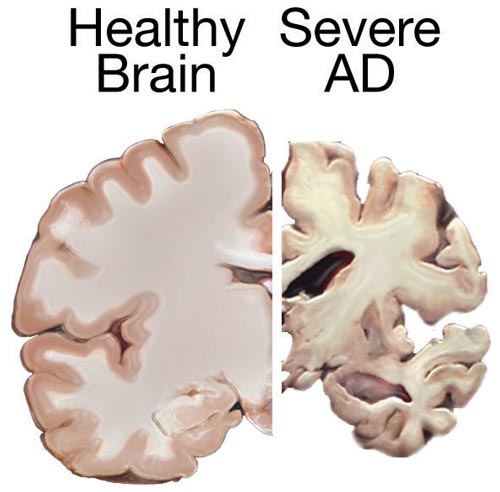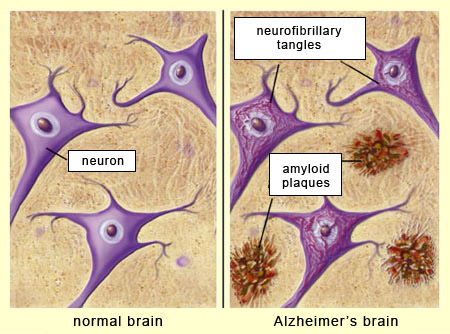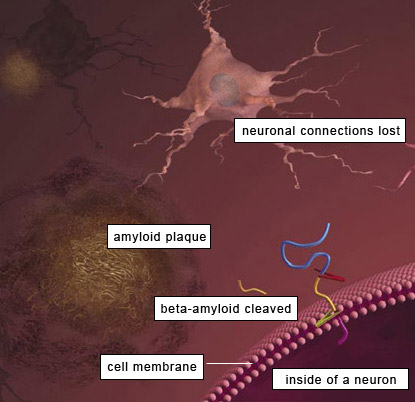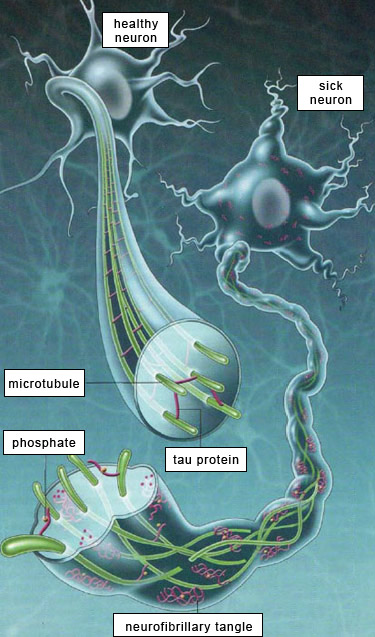Dementia
Cognitive decline is a normal consequence of the age-related changes in the brain. In contrast, dementia is not a part of normal aging. Dementia is a term for a group of symptoms caused by disorders that that affect the ability to think so severely that it impairs one's ability to perform normal daily activities like eating or getting dressed. Memory loss is a common symptom of dementia, but memory loss by itself does not mean that someone has dementia. People with dementia have progressively severe problems with functions like memory and language, or they may lose their ability to solve problems. Dementia can also cause personality changes or difficulty in controlling one's emotions. Severe dementia can also result in delusions or hallucinations.
|
FamilyDoctor.org lists the following symptoms of dementia:
|
Alzheimer's Disease
According to the National Institute of Aging, Alzheimer's disease is the most common cause of dementia among older people, and it affects an estimated 5.2 million people in the United States. Some estimates project that there will be as many as 7.7 million people with Alzheimer's disease in the US by 2030 as the Baby Boom generation ages (AARP). Alzheimer's disease is an irreversible, progressive brain disease that slowly destroys memory, language, thinking skills and the ability to plan. Over time, the ability to carry out the simplest tasks of daily living is lost. In most people with Alzheimer, symptoms first appear after age 60.
|
Comparison of Typical Age-related Memory Loss with Signs of Alzheimer's Disease |
|
|---|---|
| Typical Age-Related Memory Loss and Changes |
Signs of Alzheimer's |
| Making a bad decision once in a while |
Poor judgment and decision making |
| Missing a monthly payment |
Inability to manage a budget |
|
Forgetting which day it is and remembering later |
Losing track of the date or the season |
|
Sometimes forgetting which word to use |
Difficulty having a conversation |
|
Losing things from time to time |
Misplacing things and being unable to retrace steps to find them |
When the brains of people dying with Alzheimer's disease are examined histologically, there are two characteristic lesions seen throughout the cerebral cortex:
- Beta amyloid plaques
- Neurofibrillary tangles
Brain tissue normally has a protein called amyloid precursor protein (APP). As part of the recycling of this protein, enzymes cleave off segments referred to as beta amyloid, which are normally removed. However, in Alzheimer's disease these sticky protein segments adhere to one another and accumulate in the spaces between neurons. As these beta amyloid plaques accumulate, they have a toxic effect on the adjacent neurons and eventually kill them.
Neurofibrillary tangles are abnormalities in the microtubules inside brain neurons. Microtubules are polymers of proteins that form long cylindrical tubules within cells. These provide structure and provide a scaffold for transport of substances within cells. The microtubules are stabilized by special proteins called "tau" proteins. With Alzheimer's disease the tau protein separate from the microtubules and clump together to form intracellular tangles. The loss of functioning microtubules disrupts intracellular transport of vesicles, nutrients, and organelles.
|
|
|
|
Images from McGill University - "The Brain From Top to Bottom" http://thebrain.mcgill.ca/flash/d/d_08/d_08_cl/d_08_cl_alz/d_08_cl_alz.htm |
|
 During the early stages of Alzheimer's disease (up to ten years), there are no symptoms, but the plaques and neurofibrillary tangles accumulate and progressive kill more and more brain cells. As an increasing number of neurons die, affected brain regions begin to shrink. In the final stages of Alzheimer's disease, the damage is widespread, and brain tissue has shrunk significantly. (See the image to the right from the National Library of Medicine.) In late stage Alzheimer's disease, individuals lose the ability to carry on a conversation or respond to their environment. On average patients diagnosed with Alzheimer's disease die about 8-10 years after symptoms become noticeable to others. There is no cure for Alzheimer's disease, although several drugs have been developed which may slow the progression of disease.
During the early stages of Alzheimer's disease (up to ten years), there are no symptoms, but the plaques and neurofibrillary tangles accumulate and progressive kill more and more brain cells. As an increasing number of neurons die, affected brain regions begin to shrink. In the final stages of Alzheimer's disease, the damage is widespread, and brain tissue has shrunk significantly. (See the image to the right from the National Library of Medicine.) In late stage Alzheimer's disease, individuals lose the ability to carry on a conversation or respond to their environment. On average patients diagnosed with Alzheimer's disease die about 8-10 years after symptoms become noticeable to others. There is no cure for Alzheimer's disease, although several drugs have been developed which may slow the progression of disease.
The captioned video below [4:22 min] from the National Institute on Aging provides an overview of Alzheimer's disease.
Inside the Brain: Unraveling the Mystery of Alzheimer's Disease.




